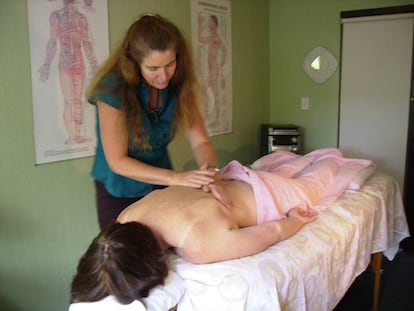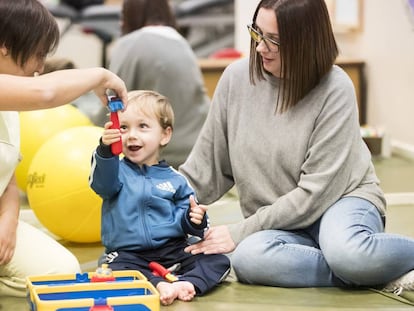Alarm over appeal of pseudo-therapies in Spain
Experts warn of serious consequences if authorities do not take action to counter the growing popularity of treatments like reiki

Apparently Spaniards are somewhat confused over the scientific basis of so-called pseudo-therapies, with experts warning of grave consequences. The last Sociological Investigation Center (CIS) survey carried out in February included questions on pseudo-medicine such as homeopathy and reiki for the first time. Despite the lack of concrete proof that pseudo-therapies can be effective, Spanish society appears hazy on what distinguishes conventional medicine from the pseudo variety.
While some expressed skepticism over the effectiveness of pseudo-therapies and explained they wouldn¡¯t resort to them because they didn¡¯t work, more stated that they hadn¡¯t used them either because they were expensive, they didn¡¯t know about them or they hadn¡¯t needed them, suggesting they could resort to them in the future.
Practices like yoga that truly promotes well-being gets confused with reiki which is simply a trick
Head of the Observatory against Pseudoscience Jer¨®nimo Fern¨¢ndez
¡°The data clearly confirms the confusion,¡± says Josep Lobera, a researcher at the Autonomous University of Madrid who says of homeopathy, ¡°Most people think it¡¯s a [conventional] medicine because it is sold in pharmacies in its box, with a prospectus and even prescription.¡±
It turns out a significant number of the medical profession are in favor of alternative therapies ¨C18.4% of pseudo-therapists have the support of healthcare professionals while 14% have been informed about a pseudo-therapy at their health clinic.
According to Elena Campos, president of the Association for the Protection of the Sick from Pseudoscientific Therapies (APETP), ¡°People go to a professional because they believe they are going to help them be cured but you could actually be getting further away from the chance of [the right] treatment. It has highlighted the need to inform the public in general and also train [medical] professionals so that they know what they are up against.¡±
In a similar survey carried out by FECYT, the Spanish Foundation for Science and Technology, 53% of Spaniards believed completely or at least partially, that homeopathy works, though only 7%? were truly convinced by its curative properties and according to the CIS survey, only 5% use homeopathy.
However, Lobera believes that the answers indicate a lack of public health information about a pseudo-therapy whose efficacy has been debunked over the past few years in medical and scientific circles. ¡°People know about it and even trust it but they don¡¯t use it because they don¡¯t need to. I find it concerning because I think there¡¯s a lack of information. People don¡¯t realize what scientific trials entail and that medicines have to prove they are effective.¡±
53% of Spaniards believed completely or at least partially, that homeopathy works
In the CIS survey, proponents of pseudo-therapies such as homeopathy, most commonly explained they used them because they were a good way of keeping healthy and they dealt with areas conventional medicine didn¡¯t cover. ¡°The perception of the adjectives ¡®natural¡¯, ¡®complementary¡¯ and ¡®alternative¡¯ as something beneficial is confusing for people. And the quacks take advantage of that; they say that it¡¯s not harmful and makes you feel good,¡± says Jer¨®nimo Fern¨¢ndez, the head of the Observatory against Pseudoscience from the Organization of Medical Colleges.
Fern¨¢ndez warns that the effectiveness of bona fide therapies is being undermined. ¡°False information and lack of knowledge ¨C it all gets mixed up. So practices like yoga that truly promotes well-being gets confused with reiki which is simply a trick,¡± he says. ¡°The most worrying thing are the people who believe, who move in this environment of faith when they should have been given trustworthy information.¡±
Lobero is carrying out a study on believers in pseudo-therapies and says that his research together with the data from the CIS survey gives serious food for thought. ¡°The problem is bigger than we had imagined because in some social groups [belief] is very strong, such as among university students. When we¡¯re referring to demographic groups with 15 to 20% of them users, that¡¯s a lot of people.¡±
Most surprising is that, according to the CIS survey, those who resort to pseudo-therapies are as happy with the results as patients of conventional medicine, suggesting a strong faith element. ¡°What worries me is that we are coming across people who have their own very solid narrative that is practically religious,¡± he says, adding that in general these same people are not anti-science or against visiting a conventional doctor, they simply consider traditional medicine to be limited and are seeking more enlightened techniques. They also form a very strong network. ¡°We are looking at very serious consequences,¡± he says.
Most people think it¡¯s a medicine because it is sold in pharmacies in its box Autonomous University of Madrid researcher Josep Lobera
In the FECYT survey, 6,300 people were asked what they would do if they had to undergo an operation for a serious problem. Only 1.8% said they would seek alternative treatment as a first option but 17% said they would consider it among their options. And while 70% said they would trust exclusively in conventional medicine, 26% said they would research the matter for themselves and 37% said that the doctor¡¯s opinion would not be decisive, with 33% relying on friends and family for recommendations. According to the CIS survey, 64% of people using pseudo-therapies find out about them through friends and family.
According to Carolina Moreno, professor at Valencia University and an expert on social perception of health, ¡°Most people aren¡¯t aware of the difference between medicine and these therapies. This should have been managed by the authorities, starting with the health sector, which does not inform and which has a report which is a nonsense with 139 therapies all thrown together, without distinguishing between them properly ¨C an extremely long and incomprehensible list.¡±
Elena Campos agrees. ¡°The health service hasn¡¯t even launched an awareness campaign, which is something we¡¯ve been seeking for over a year,¡± she says. ¡°For example, the EU has had to launch a campaign in favor of vaccines because measles has become rife due to mistrust of the measles vaccine.¡±
In Granada in 2010, an outbreak of measles revealed a network of families who had made a stand against the vaccine but were subsequently obliged to have it administered to their children by law.
English version by Heather Galloway.
Tu suscripci¨®n se est¨¢ usando en otro dispositivo
?Quieres a?adir otro usuario a tu suscripci¨®n?
Si contin¨²as leyendo en este dispositivo, no se podr¨¢ leer en el otro.
FlechaTu suscripci¨®n se est¨¢ usando en otro dispositivo y solo puedes acceder a EL PA?S desde un dispositivo a la vez.
Si quieres compartir tu cuenta, cambia tu suscripci¨®n a la modalidad Premium, as¨ª podr¨¢s a?adir otro usuario. Cada uno acceder¨¢ con su propia cuenta de email, lo que os permitir¨¢ personalizar vuestra experiencia en EL PA?S.
?Tienes una suscripci¨®n de empresa? Accede aqu¨ª para contratar m¨¢s cuentas.
En el caso de no saber qui¨¦n est¨¢ usando tu cuenta, te recomendamos cambiar tu contrase?a aqu¨ª.
Si decides continuar compartiendo tu cuenta, este mensaje se mostrar¨¢ en tu dispositivo y en el de la otra persona que est¨¢ usando tu cuenta de forma indefinida, afectando a tu experiencia de lectura. Puedes consultar aqu¨ª los t¨¦rminos y condiciones de la suscripci¨®n digital.











































